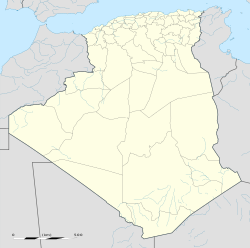Cartenna

Ruins of Roman Cartennas
|
|
| Location | Algeria |
|---|---|
| Region | Chlef Province |
| Coordinates | 36°31′00″N 1°19′00″E / 36.5167°N 1.3167°E |
Cartennas, also known as Cartenna and Cartennae, was an ancient Roman-Berber city in Mauretania Caesariensis. It is located in present-day Ténès, Algeria.
Cartennas was an ancient city that already existed in the eighth century BC, and was then called "Cartinna" or "Kartenna". The plural form "Cartennae", used in addition to the singular "Cartenna" (feminine) or "Cartennas" (masculine), suggests two cities: an ancient Berber and a dependence port of the Phoenicians. The first was situated at the wadi Allal just 1.5 km from its mouth, while the second lay near the Mediterranean sea. Cartennas was first a Phoenician and later a Carthaginian city.
After 150 BC, Cartennas was dominated by the Romans. Emperor Augustus in 30 BC established there a colony of veterans of the Legio II Augusta and the city started to grow in importance. Augustus even founded in what is now coastal Algeria the following Roman colonies: Igilgili, Saldae, Tubusuctu, Rusazu, Rusguniae, Aquae Calidae, Zuccabar and Gunugu. All these colonies were connected to Cartennas in a military way with strong commercial links. When the French conquered the area in the 1830s they confused Cartennas with Mostaganem, 50 km to the west, but the discovery of epitaphs -a few years later- in the Berber-Arab village of Tenes helped solve the mistake.
Tenes is supposed to have been a Phoenician settlement, and was a place of great importance during the Roman occupation, under the name of Cartennas. When Marshal Bugeaud fixed on this spot to establish a French colony, a fine monument, the remains of the ramparts, and other ruins, were standing, but I understand that none are now in existence, except the foundations of the ramparts beneath the present town walls, and the cisterns now utilised by the French. An interesting monumental inscription now in Algiers, records that the Roman Governor, Caius Fulcinius Optatus, successfully defended the colony against an attack by the Baquates, the Bakoutai of the Greeks, doubtless the wild Highlanders of the circumjacent Dahra. This tribe is specially mentioned by Pliny. Cartenna was rendered famous in the theological disputes which shook the African Christian Church to its centre. Rogatus, Donatist Bishop of Cartenna, established a new Sect, modifying the Donatist Heresy, and his followers were denominated Rogatists, after their founder. During the revolts of Firmus, who was subdued by Theodosius in 371, and by Gildo in 396, Rogatus took advantage of the general confusion to persecute his opponents; but his Sect did not take firm root, and during the episcopacy of Vincentius, his successor, only two African bishops were tainted with this particular heresy.Though all memorials of the Romans above ground at Tenes have been destroyed—by the Vandals, according to the French—a large portion of the old necropolis has been brought to light by the falling away of part of the cliff, probably during an earthquake. From the deck of the ship the tombs were quite perceptible, and the dark recesses ran some distance along the hill-side, sometimes assuming the form of galleries, along which no doubt vaults branched off on either side. Many of these vaults are used by the Government as magazines and cellars, and I heard that skeletons, and even pieces of clothing and jewelry, had been found in their recesses. At the other extremity of the bay I saw some remains of masonry, which probably mark the site of the Roman port.
...
Wikipedia

